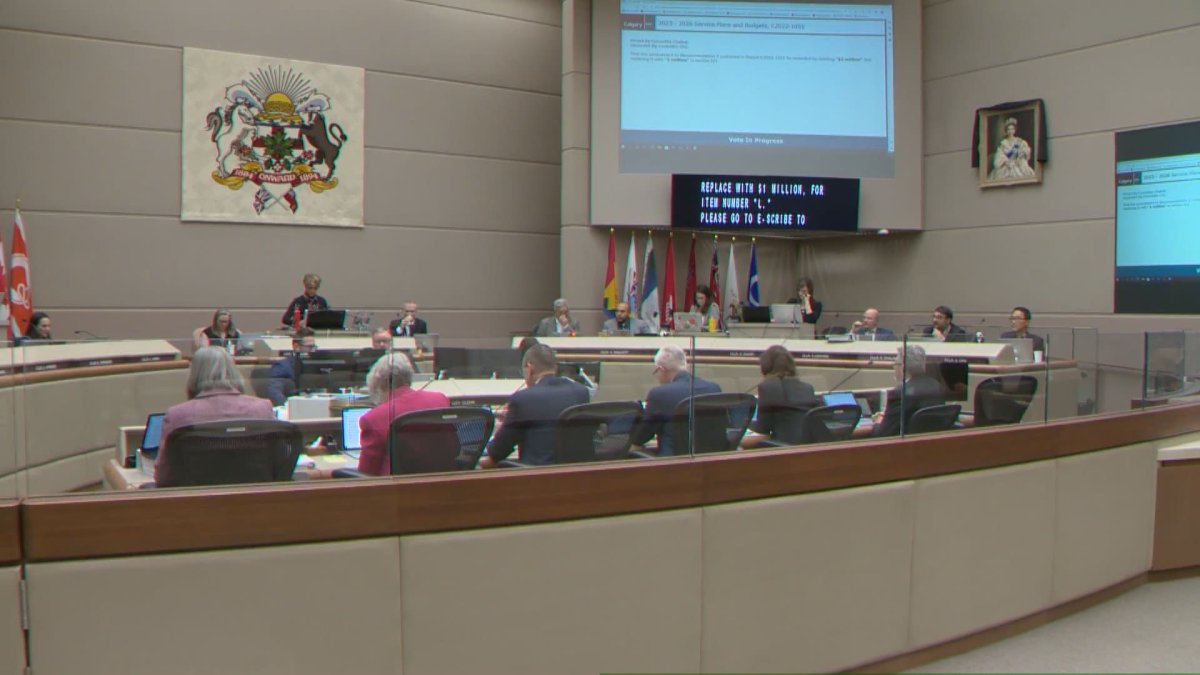Calgary city council has passed its next four-year budget after a week of deliberations and amid inflationary pressures and calls from Calgarians to invest further in several initiatives.

Mayor Jyoti Gondek called it a “tight budget,” one that, despite city council’s direction to keep increases to within inflation and population growth, still had missing elements the mayor said were “critically needed in order to support Calgarians.”
“So we found a way to add them in for 2023. We will continue to find a way to do better for the years after that.”
Friday, council approved spending nearly all of the estimated $65 million in operational surpluses in the $4.2-billion budget for 2023 and $75 million in capital surpluses. By contrast, the City of Edmonton anticipates a similar $67.8 million in operating surpluses.
CFO Carla Male said the one-time surpluses, or “positive variance,” was not recommended to go to the city’s base budget, warning it would create a “bow wave” of consequences in future years.
“While it could provide some level of relief in the next year, the taxpayers will feel that increase in the next year after that – we call that the ‘bow wave effect,’” Male said.
Citywide, property taxes will see an average annual increase of 3.7 per cent over the four-year term of the newly-approved budget. A typical single-detached home at median value can expect a 5.2 per cent increase in 2023, or $9.83 per month.
“We were able to adjust down the property tax rate, but because property values went up, there is an increase in homeowners’ property taxes. But that’s to be expected because the value of your property has gone up,” Gondek said.
While inflation in the city sits around seven per cent, city officials said residential properties saw a 14 per cent lift. That was nearly triple the five per cent non-residential properties saw.

Homeowners shoulder 52 per cent of the city’s property tax bill. Through the week of debate and presentations, council considered shifting more of that share to residential properties but resolved to delay that decision until early next year.
City council plans to appeal to the province to reduce the amount of Calgary’s property taxes that goes to the legislature, redirecting more of those funds to city operations.

Get breaking National news
“We need to figure out how much more Calgary pays in taxes compared to other municipalities and put that money back into the municipality budget,” Ward 1 Coun. Sonya Sharp said. “We know what we need to do with our money and we do it better.”
- Calgary warns tickets coming for those ignoring restrictions as water use continues to be too high
- ‘Our hearts are broken’: Hockey world reacts to tragic death of Johnny Gaudreau
- Stoney Nakoda First Nations reclaim heritage through name change
- Alberta RCMP say teen dead after confrontation with police officers
- Calgary warns tickets coming for those ignoring restrictions as water use continues to be too high
- ‘Our hearts are broken’: Hockey world reacts to tragic death of Johnny Gaudreau
- Stoney Nakoda First Nations reclaim heritage through name change
- Alberta RCMP say teen dead after confrontation with police officers
While the budget surpluses will be going towards a list of needs around the city, Sharp didn’t consider the additional items “spending.”
“It’s investing in great initiatives and giving that little boost to some of the things in the budget that didn’t get what they needed,” Sharp said.
The amendment package, brought forward by Ward 12 Coun. Evan Spencer, draws a total of $139.7 million in anticipated surpluses from both operational and capital budgets.
Transit fares will be frozen at 2022 levels next year at a cost of $3 million. An additional $3 million goes to cover the elimination of transit fares for children 12 and under, and to lower the cost of weekend family transit passes in 2023.

Civic partners like Vibrant Communities Calgary, Tourism Calgary, Sport Calgary, Calgary Economic Development and Calgary Arts Development Agency are getting funding boosts over the four-year budget.
The city’s mental health and addictions strategy got an additional $19 million for the quadrennial budget.
“Why is this important?” Gondek said. “Because our provincial government comes to the table when we show an investment like this.”
Permit fees for outdoor patios and cafes – started early in the COVID-19 pandemic – will be offset for businesses.
The Calgary Fire Department got a $10-million top-up for 2024.
One-time funding of $20 million in capital funding was earmarked for the city’s path and bike network and another $20 million for the proposed Foothills Fieldhouse, a $285.8-million project.
“The one-time money that we had is going towards keeping communities safe, keeping people well and keeping organizations open that are serving a lot of people in positions of vulnerability,” the mayor said.

The downtown revitalization strategy got an infusion of cash from the city’s real estate services reserve.
“We want to make sure that we get this right,” Spencer told reporters. “We’re balancing some pretty extreme priorities in terms of affordability and also making investments in the community to make sure we get to where we want to go.”
And the city’s reconciliation efforts got continued funding.
Council also approved the original budget brought to them by administration.
In the upcoming budget cycle, the city will see investments in transit levels, public safety, parks, economic development and tourism, climate initiatives and downtown revitalization.
With record numbers coming out to provide comment on the four-year plan, Gondek thanked citizens and organizations for sharing their thoughts as part of the budget process.
“The message was consistent,” the mayor said.
“They understood that we had created a budget that was adjusted for inflation and population growth, to be respectful of the hardship that so many Calgarians are under, but they also came to us and said, ‘This isn’t enough. This doesn’t work.'”
She also acknowledged that the pace of change in the city has picked up.
“So many unpredicted things came at us over the last few years and we are doing our best to operate in that kind of environment.”









Comments